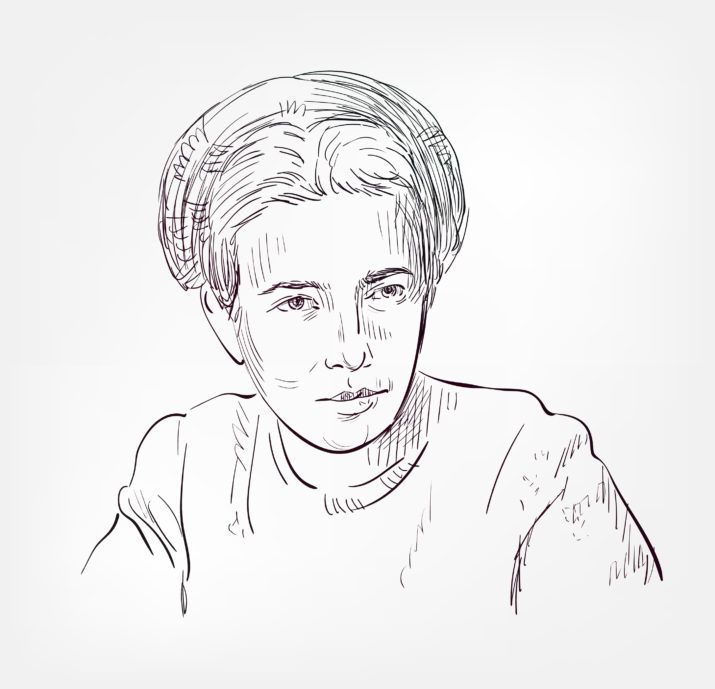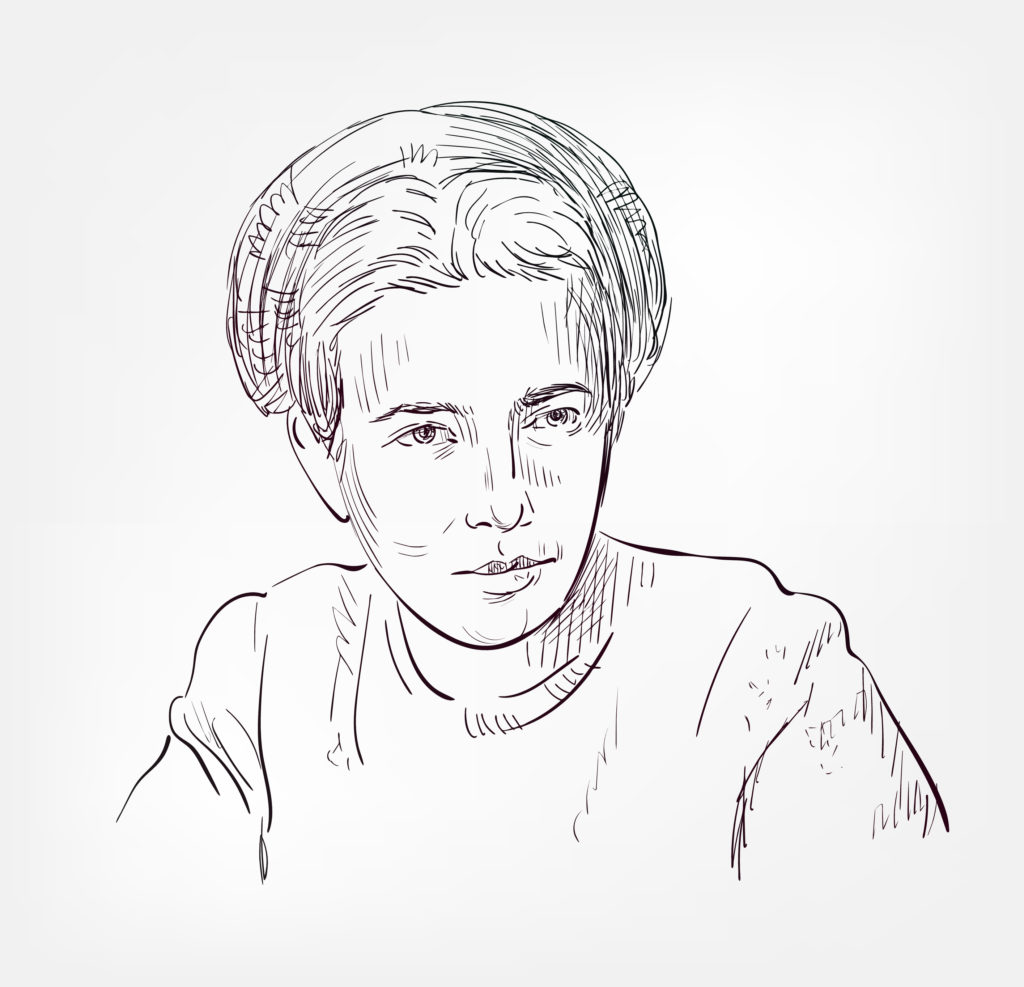

This is part of a series on the Novel Coronavirus (COVID-19) pandemic.
Simone de Beauvoir’s debut novel, She Came to Stay, follows the intrusion of an unexpected and catastrophic visitor in the protagonist’s life. At the beginning of the story, Françoise believes herself immune to outside influences. She is so convinced of her self-sufficiency that other people exist for her only “at a distance,” as if they were on the moon.[1] Then she meets Xavière, a young, impetuous woman, who gets under Françoise’s skin, invades her thoughts, and turns her world upside down.
Beauvoir began writing this foundational work of French existentialism in 1937, as the shadow of impending war clouded Europe. She finished it in 1941, during the Occupation, when German soldiers patrolled Paris, regulating her movements and those of other French people. The upheaval Françoise undergoes in She Came to Stay reflects Beauvoir’s own emotions as the war comes into her life. In a July 1940 diary entry, she writes:
I felt myself caught in a trap, tossed about in space and time, without a future, without hope…. A great cataclysm had passed through, not one that devastates the earth and leaves everything to be rebuilt, but on the contrary, one that leaves the world intact but destroys humanity.[2]
Looking at the title tropes of other texts of the period—nausea, nothingness, brokenness, nonsense, no exit, blood, terror, the stranger, the fall, the plague—we find similar preoccupations with the uncertainty inherent in human experience. The French existentialists who formed their ideas in the belly of World War II knew what it was to be afraid of mortality and an unknown future. Theirs is a philosophy born out of the desire to give meaning to their lives within the trembling softness and vulnerability of the human condition that come to light in times of global crisis.
Much like Beauvoir and her famous entourage, we, too, are contending with an unexpected and catastrophic visitor. The coronavirus pandemic therefore allows us to enter the historical experience of these French thinkers more deeply than we have before. More importantly, it shows how existentialism can empower us at the very moment when we feel most helpless and passive, when we are waiting uneasily for an outcome that we cannot know in advance.
Beauvoir insists that existentialism is not simply a philosophy, but “a practical and living attitude to the problems posed to the world today.”[3] This attitude builds from a desire to confront, rather than evade, the fundamental truths of existence no matter how frightening they are, hence its name. If we want to respond ethically to the problems we encounter, writes Beauvoir, we need to “look truth in the face.”[4] As we watch the coronavirus spread invisibly and exponentially, our situation of existential proximity to people in other nations, cultures, and walks of life is revealed in the concrete, having been there all along, beneath the abstractions fostered by global markets, political propaganda, and technological distancing.
To deny the reality and inevitability of human connection, to act as if our souls have no windows and our actions have no collective consequences, is to live in “bad faith.” A state of mind deftly elaborated by Beauvoir’s lifelong companion, Jean-Paul Sartre, in Being and Nothingness, bad faith is a lie that a person tells to himself that hinders his capacity to be free.[5] We are likely to lapse into bad faith when we are afraid, discouraged, or remorseful, because it is comforting to pretend that we aren’t crushed by uncertainty and that we are islands unto ourselves. Downplaying the risk of infection during the coronavirus crisis at the levels of infrastructure and interpersonal relations is a kind of bad faith. So is refusing to acknowledge the heavy psychological toll that comes with the virus’s laying bare the truth of our own mortality.
The opposite of bad faith is “authenticity.”[6] The authentic person knows who she is and what she values because she has spent time thinking about her place in the world. She is courageous enough to take responsibility for the ways her choices affect, not only people in her immediate circle, but also those who are different and far removed from her. A person who acts with authenticity during the coronavirus pandemic treats the present disruption of daily life as an opportunity to envision a better world and work toward its realization, even as her movements and interactions are increasingly curtailed. She reasons that if she is at risk of catching a virus that started elsewhere, then she is close enough to elsewhere to effect positive change there. She admits that her actions are significant after all, and assumes her personal role in shaping our collective existence into a future that we welcome rather than fear.
Contrary to Françoise’s assumption of individualism at the start of She Came to Stay, the authentic person admits that human lives are inescapably, and often tragically, interconnected. Beauvoir called this phenomenon empiètement, the French word for “encroachment.” Like a structure whose footprint ends up on the wrong side of a property line, we are already within each other’s borders, encroaching upon the other’s space, influencing his freedom with our actions, leaving ourselves vulnerable to intrusion. Perhaps the most basic existential truth is that, in Beauvoir’s words, “there is not an inch of my path that does not encroach on the path of another.”[7] Living in these infectious times, I now understand the meaning of encroachment with a depth that years of reading philosophy could not fill.
Before the onset of the coronavirus, I had just sat down to the first course of Hemingway’s moveable feast. The Fulbright Commission had given me a Research Scholar Award to write a book on the origins of existentialism in the city where it all started. I found a writer’s studio on the sixth floor of an eighteenth-century building in Saint-Germain-des-Prés, a few steps away from the famous cafés frequented by Beauvoir and her circle—Café de Flore, Les Deux Magots, Brasserie Lipp. Certain Parisians told me that Beauvoir herself lived in an apartment at the end of my street, and the nearby supermarket on the rue de Rennes occupies the former location of Beauvoir’s primary and secondary school, the Cours Desir. I even had tea with Sylvie Le Bon de Beauvoir, a discerning philosopher in her own right who gifted me with insight and precious glimpses of what it was like to know Beauvoir in person. Françoise’s naïve sentiment of self-possession could just as well have been my own: “I am here, at the heart of my life…”[8]
Then the unthinkable happened. A virus jumped the species barrier, from animals to humans, and began to sweep across the globe with unfailing speed. The first cases of COVID-19 arrived in France just three weeks after I did.[9] Over the next two months, I witnessed the number of infected persons in the country climb from three to 11,000. At this point, the US Department of State issued a level-four travel advisory, suspended the Fulbright Program, and called for me to evacuate Paris immediately.
As I made arrangements for an abrupt departure to Boston, paralyzed by competing feelings of disbelief, disappointment, and acquiescence, I watched President Macron’s television emission to the French people. “Nous sommes en guerre,” he repeated six times. “We are not fighting against an army or another nation, but the enemy is there, invisible, elusive, and it is advancing.”[10] The next day at noon, no one was allowed outside without an “Attestation de déplacement dérogatoire,” a signed certificate that specifies a government-approved reason for breaking the confinement order implemented to curb the spread of the virus. Police patrolled the streets checking these documents and the line to enter the grocery store that was once Beauvoir’s school reached around the block. No longer the center of French life, the still and quiet cafés mirrored the shock that all of us felt.
The Paris Beauvoir described in her wartime diary had leapt from the page and into the living present, as I recognized my own experience in her words, eighty years after she penned them:
The Flore was closed; there were a few customers on the terrace of the Deux Magots…. Everything was there: houses, shops, the trees in the Luxembourg gardens, but there were no more men…no one to open the closed-up shops, no one to walk in the streets, to rethink the past, to rebuild a future.[11]
Having come to Paris to study Beauvoir’s ideas, I instead found myself entering into her emotions through the uncanny repetition of an historical situation, a repetition that both displays striking similarities to Beauvoir’s own time and crucial differences from it.
The coronavirus crisis emphasizes existential truths that Beauvoir and her fellow philosophers knew well about the inescapability of encroachment and the human inclination away from authenticity and toward bad faith whenever vulnerability is exposed. At the same time, and as Macron’s discourse implies, contemporary lines of power and infection do not follow the same course as they did during the twentieth century, when national borders were less permeable. New technologies, globalization, and environmental degradation make human lives more interdependent than they were in Beauvoir’s era. However, these same features heighten the psychological tendency to treat other people’s lives as distant and abstract, as a function of screens and statistics rather than flesh and blood. Encroachment is more pronounced in the twenty-first century, but so is the temptation to bad faith. The current pandemic has uncovered the need for a neo-existentialism that can speak to a human condition more acute than ever before.
A reversal happened while translating the title of Beauvoir’s first novel from French to English. The phrase “she came to stay” suggests that the catastrophic visitor came of her own accord and brought havoc to the other characters’ lives that they docilely received. However, the French title, L’Invitée, is literally rendered as “the invited one.” At the end of the book, Françoise realizes that she was responsible for her life all along. Other people are not on the moon. They are here on earth, in my vicinity, where the inevitability of mutual influence must be taken into account.
The arrival of the coronavirus has brought the truth of our existential nearness to one another home to us. As unsettling as the reality of encroachment is, it is also the ground for an ethics. We are not passive observers to an unfurling history, but captains of meaning who can determine a different future through honest reflection and authentic action.
Jennifer McWeeny is an Associate Professor of Philosophy at Worcester Polytechnic Institute. She regularly writes on existentialism, feminism, and panpsychism, and has published two books on cross-cultural philosophy: Speaking Face to Face: The Visionary Philosophy of María Lugones (2019), co-edited with Pedro DiPietro and Shireen Roshanravan, and Asian and Feminist Philosophies in Dialogue: Liberating Traditions (2014), co-edited with Ashby Butnor. She is a recipient of the Fulbright National Research Scholar Award and the Editor in Chief of Simone de Beauvoir Studies.
References:
[1] Simone de Beauvoir, She Came to Stay, trans. Yvonne Moyse and Roger Senhouse (New York: W. W. Norton, 1990), 16. Originally published in French as L’Invitée (Paris: Gallimard, 1943).
[2] Simone de Beauvoir, Wartime Diary, trans. Anne Deing Cordero, ed. Margaret A. Simons and Sylvie Le Bon de Beauvoir (Urbana: University of Illinois Press, 2009), 293. Originally published in French as Journal de guerre: Septembre 1939-Janvier 1941, ed. Sylvie Le Bon de Beauvoir (Paris: Gallimard, 1990).
[3] Simone de Beauvoir, “What Is Existentialism?” trans. Marybeth Timmerman, in Philosophical Writings, ed. Margaret A. Simons with Marybeth Timmerman and Mary Beth Mader (Urbana: University of Illinois Press, 2004), 323-326, p. 324. Originally published in French as “Qu’est-ce que l’existentialisme?” France-Amérique, June 29, 1947.
[4] Simone de Beauvoir, The Ethics of Ambiguity, trans. Bernard Frechtman (New York: Citadel Press, 1976), 9. Originally published in French as Pour une morale de l’ambiguïté (Paris: Gallimard, 1947).
[5] Jean-Paul Sartre, Being and Nothingness: A Phenomenological Essay on Ontology, trans. Hazel E. Barnes (New York: Washington Square Press, 1956), 86-116. Originally published in French as L’Être et le néant. Essai d’ontologie phénomenologique (Paris: Gallimard, 1943).
[6] Simone de Beauvoir, The Second Sex, trans. Constance Borde and Sheila Malovany-Chevallier (New York: Alfred A. Knopf, 2010), 10. Originally published in French as Le Deuxième Sexe, 2 vols. (Paris: Gallimard, 1949).
[7] Simone de Beauvoir, The Blood of Others, trans. Yvonne Moyse and Roger Senhouse (New York: Penguin, 1948), 115. Originally published in French as Le Sang des autres (Paris: Gallimard, 1945). For more on the philosophical notion of encroachment and its origins in Beauvoir’s thought, see Emmanuel de Saint Aubert, “The Blood of Others: Maurice Merleau-Ponty and Simone de Beauvoir,” Simone de Beauvoir Studies, vol. 30, no. 1 (2019): 33-65.
[8] Beauvoir, She Came to Stay, 14.
[9] “Coronavirus: un troisième cas d’infection confirmé en France,” Le Monde, January 24, 2020.
[10] Emmanuel Macron, “‘Nous sommes en guerre’: le verbatim du discours d’Emmanuel Macron,” Le Monde, March 16, 2020.
[11] Beauvoir, Wartime Diary, 293.
Photo: Simone de Beauvoir vector sketch | Shutterstock
Published on April 21, 2020.




